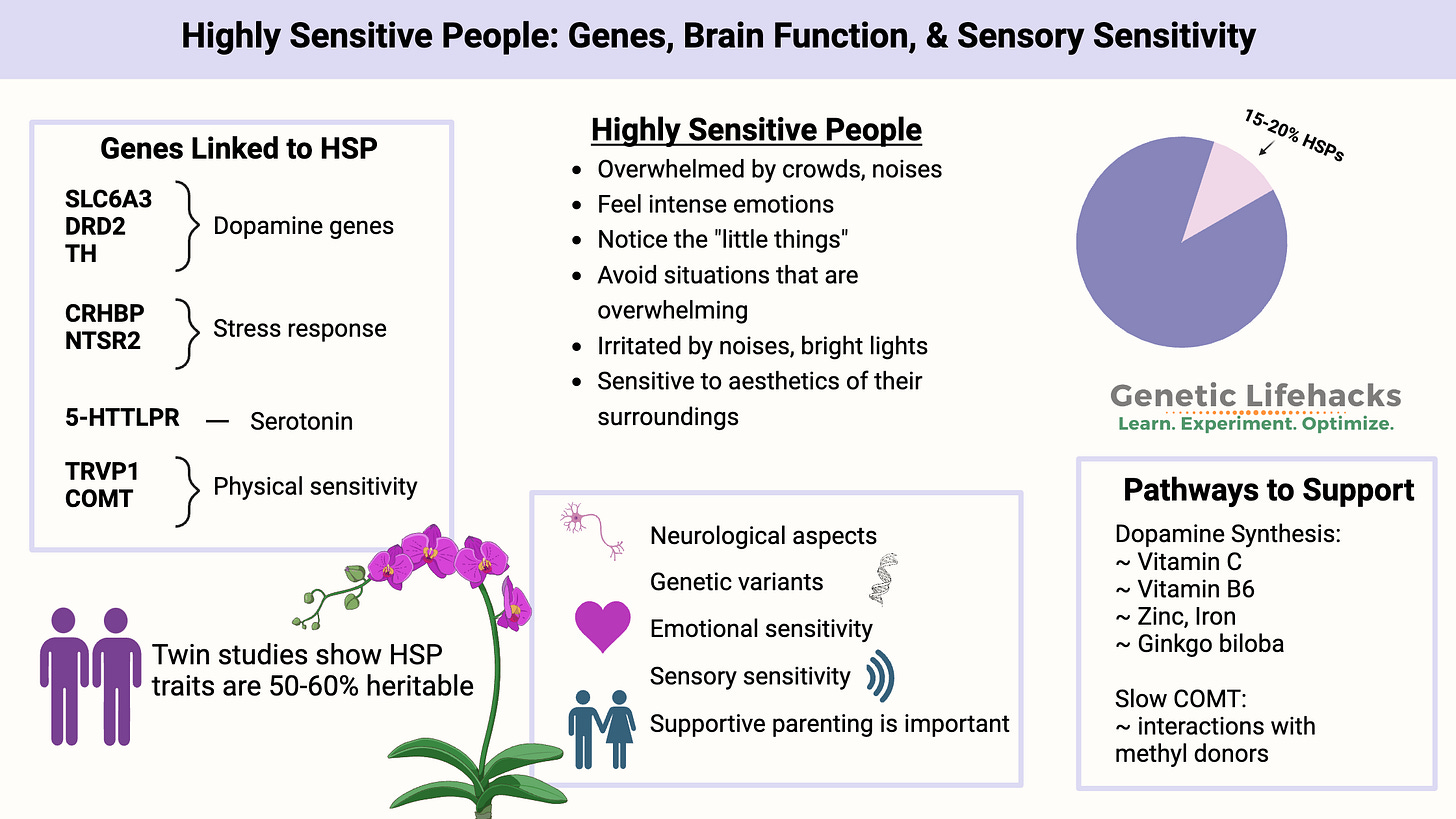Hi everyone,
Have you ever wondered why some people are more sensitive to their environment and the emotions of those around them? Over the past year or so, several members reached out asking me to write about the genes involved in being a Highly Sensitive Person (HSP), a topic that was new to me.
After digging through quite a bit of research on HSPs, I found that there was some fairly good genetic research on why some people are more sensitive to their environment and the feelings of people around them. The Highly Sensitive Person trait is a combination of genetics and life experiences.
It turns out that I'm not a highly sensitive person, which may explain my initial skepticism on hearing about HSPs. However, the research on HSPs was a great reminder to me as to how genetic changes can come together to make us all unique, creating different strengths and some challenges.
This article is open to everyone (no member paywall) for the next few days. Feel free to share it with friends and family who might identify as Highly Sensitive Persons—it could help them better understand and appreciate their unique genes.
Switching gears - I'm trying out some new features to make articles easier to understand. Check out the graphical overview and the genotype preview at the beginning of the new article. I would love to hear your feedback!
Stay curious,
~ Debbie Moon
Highly Sensitive People: Genes, Brain Function, and Sensory Sensitivity
What is a Highly Sensitive Person (HSP)?
Highly Sensitive People (HSPs) are individuals with heightened sensitivity to environmental stimuli, deeper cognitive processing, and high emotional reactivity. The term was popularized by psychiatrist Dr. Elaine Aron, who began studying and writing about the characteristics of HSPs in the 1990s.[ref]
In short, some people are simply more sensitive to both emotions and physical stimuli – such as small sounds, visual distractions, or the feelings of others around them. HSP is increasingly understood in the context of genetic variants, the combination of genetics and childhood experiences, and changes that can be seen on brain imaging scans.
Dr. Aron created a psychological test and scale to measure sensitivity. Based on this Highly Sensitive Person Scale, researchers narrow down the three factors that influence sensitivity:[ref]
Easier excitation (HSPs tend to avoid scary movies and overwhelming situations)
Aesthetically sensitive (HSPs notice colors, surroundings, artwork, and music)
Low sensory threshold (They may be irritated by tapping pencils, the high-pitched hum of a fan, and bright lights)
These traits are found in 15-20% of the population, and psychologists have linked the trait to inheriting variants in certain groups of genes.
The terms “highly sensitive person,” “environmental sensitivity,” or “sensory processing sensitivity” are used in psychological research. While there are some technical differences in the definitions of these terms, in essence, researchers are able to quantify and describe the differences found in people who are highly sensitive to both negative and positive environments. These differences may include a heightened awareness of interactions with other people or a heightened sensitivity to the physical environment.
Latest on Longevity Lifehacks Substack:
Epigenetic Tests for Biological Age: How to decrease your biological age by 5 years
Spoiler alert - circadian rhythm plays a role in the epigenetic markers that biological age tests are looking at. New research shows that the time of day that you take the test matters quite a bit. This is likely also true for methylation tests.
(Sign up here to get the Longevity Lifehacks article in your inbox each week)
What I've been reading:
1) Variants in the Kallikrein Gene Family and Hypermobile Ehlers-Danlos Syndrome
A new study (preprint) has identified genetic mutations in the kallikrein gene family as being linked to hEDS. The researchers then showed how the pathways are affected by the mutations through animal studies. It's an interesting study and worth reading if you or anyone you know has hEDS.
Updated Genetic Lifehacks article: Ehlers-Danlos Syndrome
2) Eight-Week Creatine-Glucose Supplementation Alleviates Clinical Features of Long COVID
A small clinical trial in long Covid patients showed that the combination of creatine + glucose helped to relieve some long Covid symptoms such as headache, brain fog, and general malaise.
Related article: Creatine: Boosting muscles and increasing brain power
3) Bartonella species bacteremia in association with adult psychosis
A new study showed that people with psychosis were 3 times as likely to have Bartonella DNA in their bloodstream. Bartonella sp. are bacteria that are often spread by ticks, fleas, and lice, and some people are more likely to have long-term infections and not clear the bacteria.





